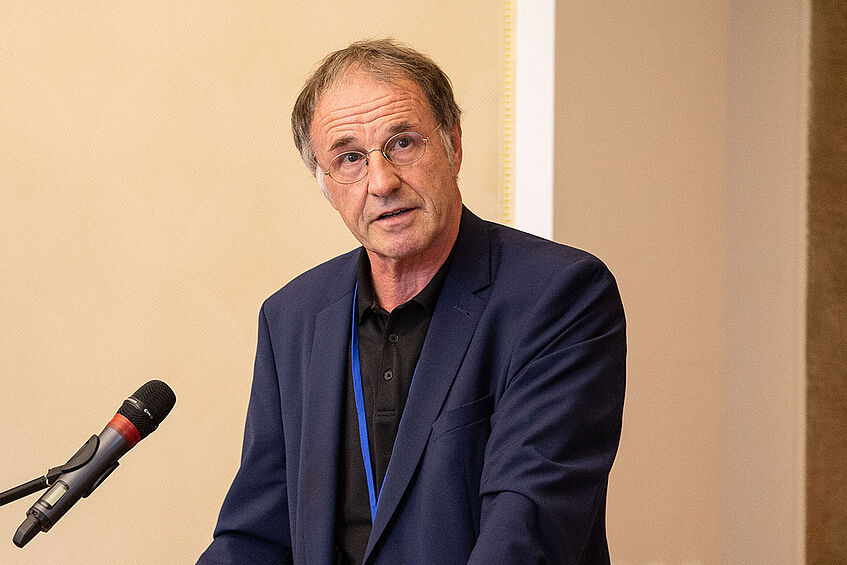Friedrich Stadler: "The Vienna Circle was based on, and profited from its multilingual, multi-ethnic and international communication between several generations".

Prof. Stadler speaking during the official opening of the exhibition about the Vienna Circle in Prague ©Charles University Prague
Friedrich Stadler: "The Vienna Circle was based on, and profited from its multilingual, multi-ethnic and international communication between several generations".
Prof. Friedrich Stadler is the co-curator (together with Prof. Karl Sigmund) of the exhibition “Vienna Circle” which opened its doors to the public on 4th October 2021 at Charles-University in Prague. In the interview he talks about the impact of analytical philosophy and how the "Vienna Circle" would look differently in today's academic world.
Why did the "Vienna Circle" (logical positivism/logical empiricism) emerge (right here) in Central Europe and not - for instance - in UK, where analytical philosophy had also been very influential?
Friedrich Stadler: There was a sort of a "critical mass" in Central Europe, and especially in Austro-Hungary, where Kantianism or German idealism, if you will, was rejected for philosophical, religious and political reasons. It was the manifestation of the so called typical "Austrian Philosophy" in the line of Bolzano-Brentano-Mach up to the Vienna Circle with Wittgenstein and Popper. This intellectual tradition was born in the Habsburg Monarchy and continued in Vienna during the First Republic. Analytic philosophy was present in the UK at the same time, but rather restricted to logic and language analysis marginalizing philosophy of science.
There is an important lesson to be learned since Mach, Bolzano and Einstein: Analytic philosophy is not identical with philosophy of all sciences (Wissenschaftsphilosophie).
How big an impact did the "Vienna Circle" have on the Philosophy of Science, or on the academic discourse in general in Central Europe?
Stadler: Scientific philosophy and Logical Empiricism exerted an enormous influence in Europe. Mutual interaction was present with related circles in Berlin, Prague, Lvov/Warsaw and in the Nordic Countries but also in Cambridge, Oxford, London and Paris, till the outbreak of WW II. The forced migration caused by political and anti-semitic reasons destroyed all these flourishing intellectual networks, to be continued by a trans-Atlantic move. Contemporary analytic philosophy and philosophy of science incorporated the main achievements of this unique movement between the wars. The Vienna Circle was based on, and profited from its multilingual, multi-ethnic and international communication between several generations, including women.
| The exhibition about Vienna Circle was originally produced for the occasion of the 650th anniversary of the University of Vienna in 2015. Since then it has been successfully shown at the Zentrum für Kunst und Medien in Karlsruhe. Beginning with the academic year 2021/2022 the exhibition will visit all universities, which are members of the CENTRAL Network (Prague, Warsaw, Budapest, Berlin). First opening took place on 4.10. 2021 at the Charles-University in Prague and can be seen in in the historic buildings of Carolinum until 12.11.2021. |
|---|
Could something like the "Vienna Circle" still be emerging in today's academic world? What aspects would still be possible?
Stadler: This is difficult to answer: between the wars there existed a unique constellation with the appointment of an excellent physicist-philosopher Moritz Schlick, accompanied by gifted young philosophers and scientists with many guests from abroad, and at the same time reform movements in the multi-ethnic metropolis with the common utopian aim of an "Aufbau" of a "Republic of Scholars" after the catastrophic First World War. This could be the case again after a similar cultural and political break, but the new social media would certainly determine different ways of communication, replacing continuous personal encounters and travels. Some institutions and societies in the tradition of Logical Empiricism (for example the Institute Vienna Circle at the University of Vienna, Commission of History and Philosophy of Sciences at the Austrian Academy of Sciences or Austrian Wittgenstein Society) indicate the continuation and further development of the historical Vienna Circle in different contexts. The remaining challenge is the interdisciplinary discourse with scientific philosophy as an accepted player besides the individual disciplines.
Friedrich Stadler is an Austrian historian and philosopher and professor for history and philosophy of science at the University of Vienna. He is the founder (in 1991) and long-time director of the Institute Vienna Circle, which was established as a Department of the Faculty of Philosophy and Education of the Vienna University in 2011. Currently he is a permanent fellow of this Department and serves at the same time as the Director of the co-operating Vienna Circle Society, which is the continuation of the former Institute Vienna Circle as an extra-university institution.
